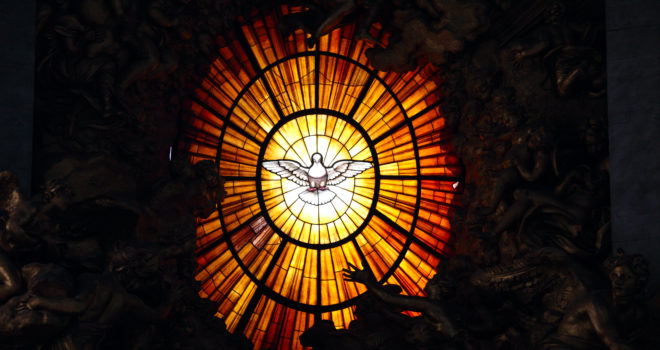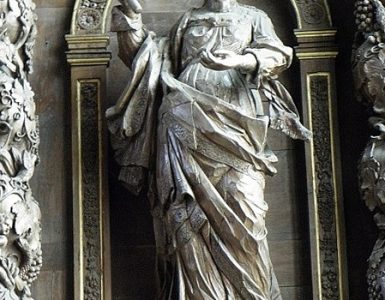The Holy Spirit wants to give us intimacy with Himself, imparting His own strength to us and making our lives new. But how do we draw near so that the Holy Spirit may work these miracles of love in and for us? In his wonderful encyclical on the Holy Spirit, Pope Leo XIII encourages us simply to start speaking to the Holy Spirit dwelling within us (1 Cor. 3:16). Closeness to the Holy Spirit is not a reward offered to holy people but rather a healing remedy and precious gift meant for every one of us.
If we feel dissatisfied and are “borne down with trouble,” if we long for more joy and peace in our lives, let us ask the Holy Spirit to help us and to draw us close. If we are already blessed to know and love the Holy Spirit, may we draw even closer. Regardless of what our present is like or what our past has been, let us at this very moment “fly” to the Holy Spirit, who is for every one of us “the never-ceasing fount of light, strength, consolation, and holiness,” (Pope Leo XIII, Divinum Illud Munus).
Pope Leo encourages us to speak to the Holy Spirit often throughout the day, praying for His help in our every need and for His anointing upon everything we do. Peace starts to fill our soul when we ask the Holy Spirit to free us from sin, to heal our wounds, and to give us His joy. Distress begins to give way to a contented heart as we learn to thank the Holy Spirit for the countless blessings He has given us, often without our even noticing them. Most of all, the Holy Spirit’s strong and tender power increasingly fills us when we ask Him every day for the grace to know and love Him more dearly.
How different our lives become especially when we resolve to begin every day with prayer to the Holy Spirit, imploring Him to anoint our every breath and every second of our lives. St. John Vianney promises us that, if we do this, particularly when we are discouraged or weighed down with problems, the Holy Spirit’s gentle power and peace will take hold of our hearts. Comforted in sadness and strengthened in trials, we will start to find “all sorts of happiness” within us. What is not of God will increasingly lose its attraction to us, and our thoughts, desires, words, and deeds will become more good. Most of all, we will discover how “beautiful” it is to be “accompanied” at every moment of our lives by the Holy Spirit, who never ceases to protect and care for us.
St. John Henry Newman & the Holy Spirit
If we are hesitant to surrender ourselves completely to the Holy Spirit, let us draw encouragement from saints such as John Henry Newman. As a youth, Newman had sensed that the Holy Spirit wanted to draw him very close to Himself. But Newman resisted. Suspecting that intimate friendship with the Holy Spirit would constrain rather than free him, he tried to put the Holy Spirit out of his mind: “I wished . . . to go my own way.” The Holy Spirit, however, would not let go of him. Filling him with good thoughts and desires, with peace and joy and strength even in his weakness, the Holy Spirit inspired Newman to pray to Him every day. And, through “infinite compassion” for him, the Holy Spirit began gently and powerfully to take complete and wonderful “possession” of his soul.
In spite of his initial resistance, Newman grew increasingly close to the Holy Spirit and docile to His tender inspirations. Newman was a priest of the Church of England, an honored fellow at Oxford University, and a respected vicar at St. Mary’s, where he preached renowned sermons. He became an esteemed leader of the Oxford Movement, seeking to renew Catholic elements in the Anglican faith. His efforts to identify the foundations of the Church of England in the early Church Fathers and councils, however, estranged him from other Anglican clerics and prelates. After intense prayer and study, Newman became convinced that he could no longer adhere to the Anglican Communion, which he had once believed was the true Church of Christ. He resigned as vicar of St. Mary’s, and, with the Holy Spirit’s grace and strength, eventually entered into full communion with the Catholic Church.
This life-changing decision cost him dearly. But the Holy Spirit did not abandon him. Two years after his conversion, Newman was ordained a Catholic priest. His life as a priest and scholar in the Catholic Church brought its own trials, including disappointing outcomes in several ministries, as well as suspicion and prejudice. With time, however, Newman’s theological contributions gained the respect they deserved, and Pope Leo XIII honored him by naming him a cardinal of the Church.
In his daily Meditations and Devotions, we have a privileged glimpse into Newman’s intimacy with and total dependence on the Holy Spirit during his life. As Newman’s own intimacy with the Holy Spirit deepened, his constant prayer to St. Philip was that he, too, would be filled with the same “true devotion” to the Holy Spirit that St. Philip cherished. As Newman notes, it was precisely St. Philip’s love for the Holy Spirit that had attracted Newman to this joyful saint.
As we read Newman’s Meditations and Devotions, we are moved by his confession of complete helplessness without the Holy Spirit’s strength and grace. In one of his prayers, he cries out to the Holy Spirit in words that cannot help evoking the same sentiments from our own hearts:
I cannot have one good thought or do one good act without Thee. I know, that if I attempt anything good in my own strength, I shall to a certainty fail. I have bitter experience of this. . . . Lead me forward from strength to strength, gently, sweetly, tenderly, lovingly, powerfully, remembering my . . . feebleness, till Thou bringest me into Thy heaven.
— St. John Henry Newnan, Meditations and Devotions
In a sermon Newman had preached for the feast of Pentecost while he was still a priest of the Church of England, he speaks about the special “comfortings” the Holy Spirit gives to those who are suffering troubles and misfortune. Newman surely is alluding to his own trials, but he is also speaking to every one of us. He reminds us of what we, too, discover by our own experience: without the Holy Spirit, we fail miserably. Focused on ourselves and relying on our own supposed strength, we are filled with anxiety; allured by superficial things, our souls are dissatisfied. When we draw close to the Holy Spirit, however, we begin to experience true peace and tender love, for the Holy Spirit is the living Love between the Father and the Son. And, because who “the Holy Spirit is in heaven” He also is “abundantly on earth,” the Holy Spirit is the “never-failing fount of charity” and of peace and of joy within us.
As Newman meditated on the precious graces that the Holy Spirit had so tenderly lavished on him throughout his life, he could only cry out in gratitude, “O Source of my Bliss,” “I . . . bow down in awe before the depths of Thy love.” “Source of my Bliss”: what a beautiful name by which to draw close to the Holy Spirit! If, like Newman, we daily beg the Holy Spirit for the grace to know and love Him more dearly, we, too, will be filled with gratitude for the “infinite preciousness” of the Holy Spirit’s intimate love for us. As Newman himself assures us, where the Holy Spirit is known and loved, doubt, gloom, and dissatisfaction are driven out, and a loving heart and contented spirit enter in.
The Love of the Holy Spirit: St. Angela of Foligno
St. Angela of Foligno is another saint who encourages us to believe how dearly and personally the Holy Spirit loves us and wants to be close to us. On a pilgrimage, Angela had prayed to St. Francis, asking for his help to love the Lord Jesus more deeply and to live her Franciscan life more fervently. In answer to her prayer, Angela was astonished to find that the Holy Spirit who spoke to her heart, telling her of His infinite love for and delight in her.
Angela was deeply moved to hear the Holy Spirit speak these tender words to her soul: “Love me, because you are very much loved by me, much more than you could love me.” What an exquisite pledge of love; what a tender request for the return of that love! May the Holy Spirit’s beautiful words to Angela be seared into our own souls, for the Holy Spirit speaks them to each one of us.
Many of us already have experienced blessings of the Holy Spirit’s intimate love for us, even if we have not always realized that the Holy Spirit is the One who has so tenderly imparted them to us. Let us pray for the grace to realize and appreciate now the countless gifts that, in the Trinity’s plan of love, the Holy Spirit has brought to us: the joys of loving and being loved; the blessings of a cherished family and good health; the treasure of our gifts and accomplishments; the granting of longed-for healings and favors; the surprise of unexpected blessings; the miracles of wonderful conversions and lives changed for the good; the joy of knowing and loving the Trinity; the gift of cherishing the Mass and the precious sacrament of the Eucharist; the treasured strength and comfort of our Faith.
Whether we have been converted by the Holy Spirit’s grace, like St. Augustine of Hippo, or preserved by that same grace, like St. Thérèse of Lisieux, what the Holy Spirit desires from us in return for the manifold blessings He has bestowed on us is simply our love, not for His benefit but for ours. The Holy Spirit desires our love! Surely, love is the easiest and sweetest gift we can give to the Holy Spirit, for “everyone can love.”
✠
Editor’s note: This article is adapted from a chapter in Sr. Fatula’s upcoming book, Drawing Close to the Holy Spirit: Keys to a Transformed Life and Joyful Heart. It is scheduled to be released on Jul 27, 2021 and is available to pre-order from your favorite bookseller or online through Sophia Institute Press.
We also recommend Sr. Mary Ann Fatula’s previous book, Heaven’s Splendor. You can preview that book (for free) in the following articles from Catholic Exchange:













